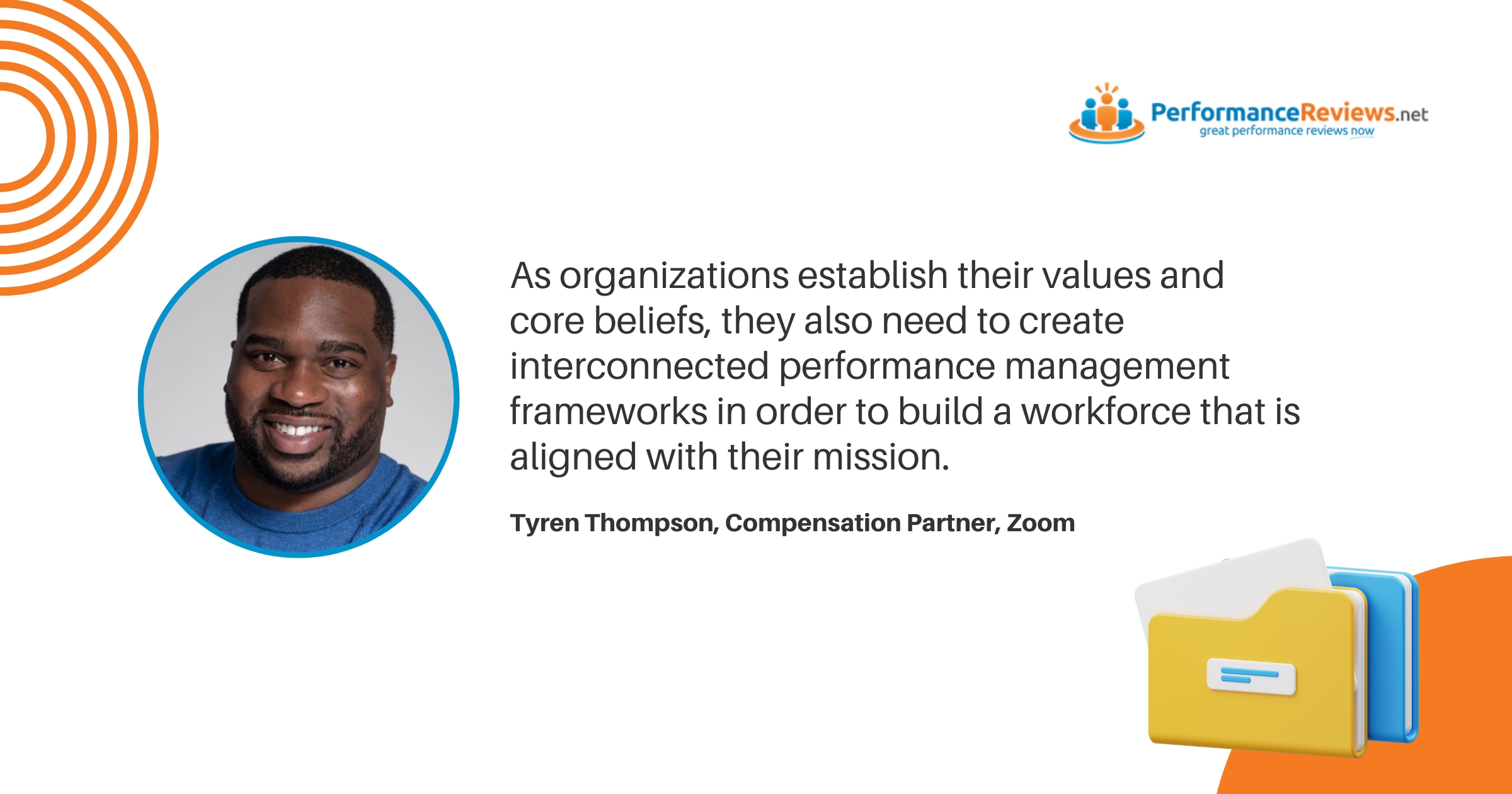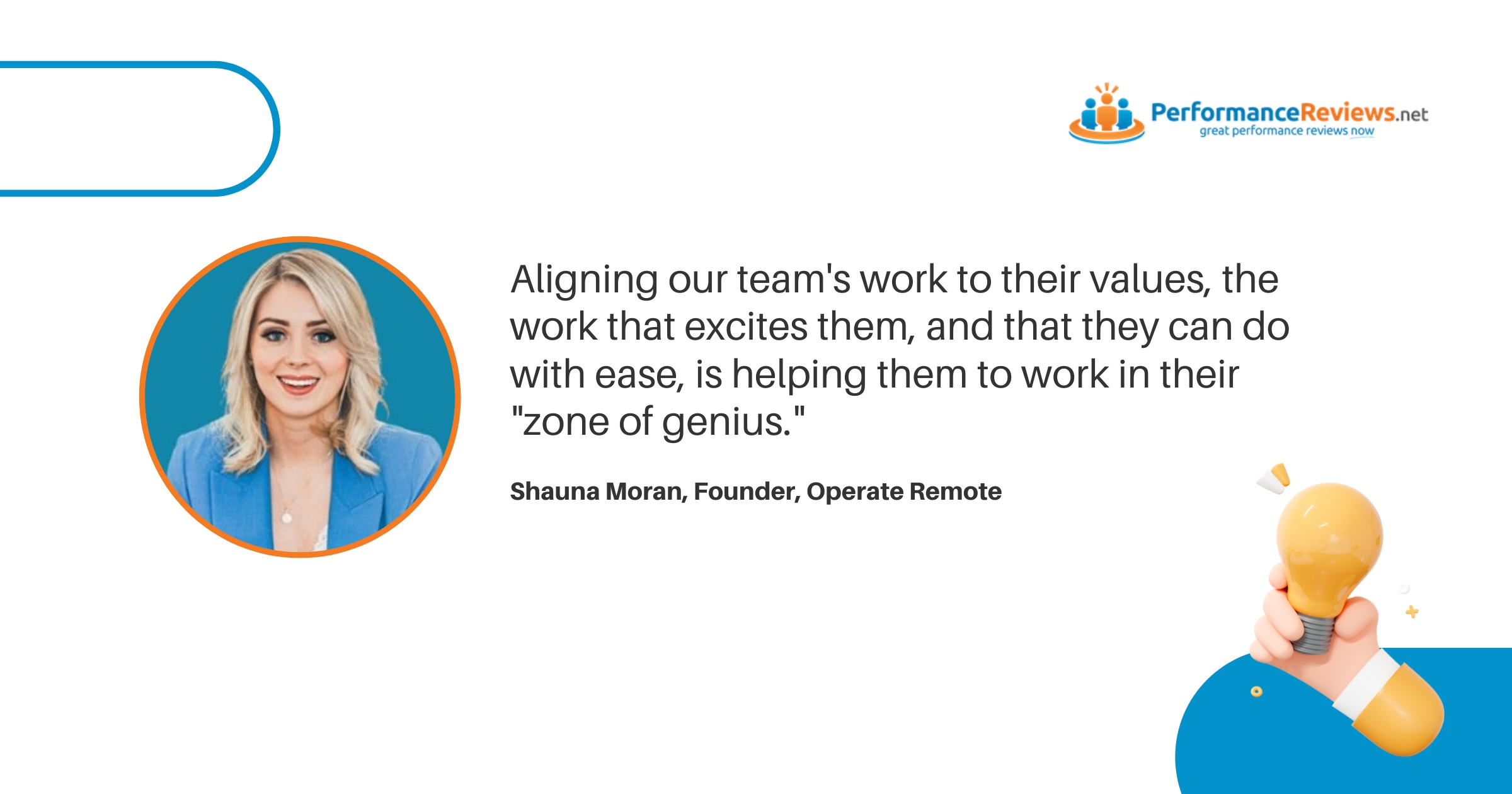From linking performance to goals to putting strength as a primary focus, here are eight answers to the question, “As a manager, what are some helpful tips about making employee performance reviews more effective to positively change employee behavior?”
- Link Performance to Goals
- Create an Improvement Plan for Every Criticism
- Redefine Success
- Understand Motivations Within Your Team
- Help Solve Problems but Value Accountability
- Schedule a Follow-Up With Specific Goals
- Lean Into Strengths
Link Performance to Goals
One helpful tip for making employee performance reviews more effective is to break down the performance discussion into specific areas and link them to individual goals. This gives employees a sense of responsibility for their role in meeting organizational goals and fosters positive behavior changes.
For example, you could establish that one team member’s goal is to increase customer satisfaction scores by 30%. During the review, you’d focus on ways they did (or didn’t) meet those targets, helping them to understand how their efforts tie into the bigger picture. This encourages employees to take ownership of their roles and strive for better results in the future.
Michael Alexis, CEO, Swag.Org
Create an Improvement Plan for Every Criticism
Performance reviews are usually not a lot of fun for anyone involved, but I’ve found that the most important thing is to have an improvement plan at least partially fleshed out when coming into the meeting with the employee based on comments from their line manager and self-review.
Many employees will have a plan for personal development, which is great and should be highly encouraged, but I’d recommend that reviewers take the time to match each critique in their performance to some way for them to address it—make it the two of you against the problem (or a way for them to advance their career) rather than you versus them.
Dragos Badea, CEO, Yarooms
Redefine Success
Performance reviews are often focused on specific job-related tasks, which can be effective in facilitating success in one role, but are disconnected from establishing ongoing success. As organizations establish their values and core beliefs, they also need to create interconnected performance management frameworks in order to build a workforce that is aligned with their mission.
One way to do this is to redefine success. In the formal review process, instead of asking employees to simply recap their achievements and quantifiable results, we may ask them to discuss how they have developed a stronger capacity to make better decisions. This approach challenges the employee to connect their achievement to behaviors that are critical and applicable in other roles and areas of the business.
Tyren Thompson, Compensation Partner, Zoom

Understand Motivations Within Your Team
Helping our teams connect their day-to-day work and performance reviews to the overall company goals and objectives is not only crucial in increasing motivation among our team members, but it also supports them in feeling like they’re part of a team. It also helps them to see clearly the impact of their work. Aligning our team’s work to their values, the work that excites them, and that they can do with ease, is helping them to work in their “zone of genius.”
Consider your own role at work; there are probably some tasks and areas of your job that you really love. This type of work gives you energy because you feel capable of it and, at the same time, it excites you. We all have these feelings towards certain aspects of our job, and we also have tasks we don’t necessarily enjoy. Of course, that’s part of life, doing and completing tasks we don’t want to do, but as a leader, when you understand what excites your team members the most, performance will naturally increase.
Shauna Moran, Founder, Operate Remote

Help Solve Problems but Value Accountability
In my experience, you must approach underachievement seriously during a performance review. Try to establish solutions for actual problems, but hold people accountable if they haven’t pulled their weight: it’s effective in changing employee behavior because it sends a coherent message that the issue is significant and needs to be addressed.
When an employee sees that their underachievement is being taken seriously, they are more likely to recognize that they need to adjust their behavior in order to meet the expectations of their role. This can increase their motivation to improve and make them more receptive to feedback and suggestions for how to do so. Additionally, taking underachievement seriously establishes a sense of accountability for the employee, which can help to increase their commitment to meeting the expectations of their role.
Piotrek Sosnowski, Chief People & Culture Officer, HiJunior
Schedule a Follow-Up With Specific Goals
One tip I use as a manager to make employee performance reviews more effective to positively change employee behavior is to schedule a follow-up meeting with specific metrics to meet in the interim.
This allows me to check in with the employee and review their progress on the goals we discussed during the performance review. During this meeting, I can provide feedback and guidance to help the employee reach their goals. This also gives me an opportunity to recognize any progress made and provide additional support if needed.
By scheduling these follow-up meetings, I can track employee goal progress and propose suggestions, when needed, to ensure their success.
Grace He, People & Culture Director, Teambuilding.Com
Lean Into Strengths
In my experience, performance reviews are too heavily focused on where an individual needs to improve, rather than focusing on what they do well and how they can become an expert in that area.
When I held reviews with my teams, I began by focusing on the year that had gone by; we reviewed their objectives and discussed how they felt they performed against each one. By this point, you both had a picture of what the individual’s strengths and areas of development were.
Rather than focusing on the latter, focus on their strengths—this is where they are operating in their “zone of genius;” what can you do to get them to develop in these areas? Sure, they need to improve areas where they are not so strong, but only to reach a competent level; we waste too much energy on improvement plans in these areas. Of course, for this to really work, you need to hire a diverse team, not just a team of robots!
Jane Ferré, Executive Career Coach, Jane Ferre Coaching




